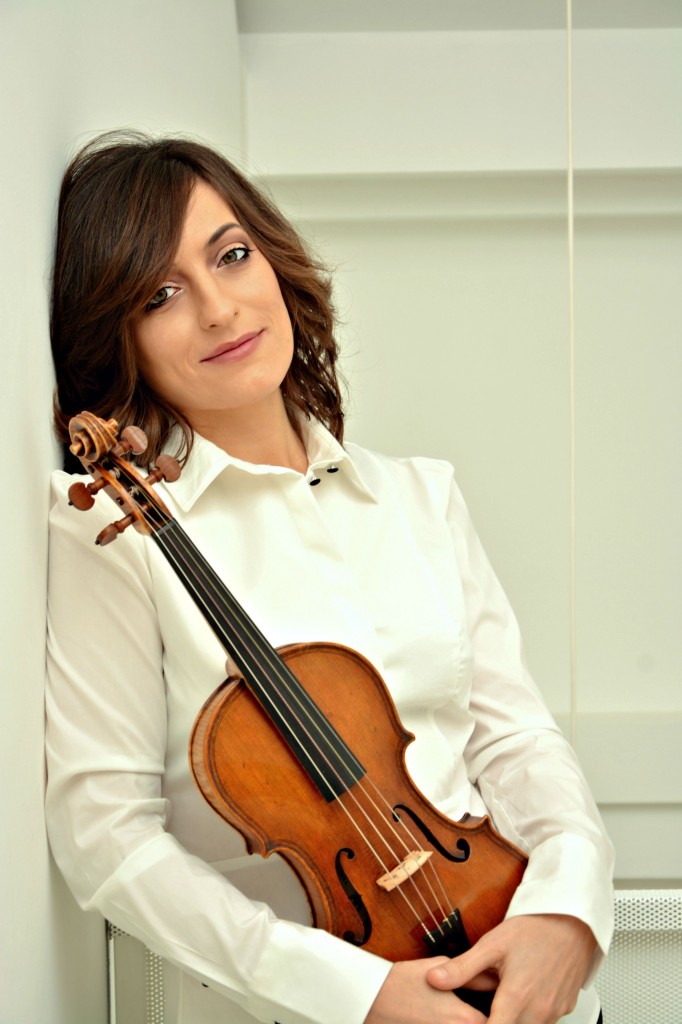Photo by Monica Cordiviola
JAMES STRECKER: If you were asked for 50 words for an encyclopedia to summarize what you do, or have done, in the arts, what would you say?
ELISA CITTERIO: My many years of study and my encounters with mentors and masters have left me with a great passion for teaching. On the one hand is my specialization in early repertoire on period instruments, which has culminated in a schedule full of events concentrated in baroque and classical music; on the other hand are my years in one of the world’s most famous orchestras, La Scala. Both paths have been reciprocally stimulating and enriching.
JS: What important beliefs do you express in or through your work?
EC: Music is a primary need for us humans. Even prehistoric drawings depict rudimentary musical instruments, suggesting that food is not the only thing required for our sustenance. Music is something that our bodies, minds —and for those who believe — our souls, need. Music changes us and accompanies us in every crucial moment of our lives. Music is communication, it’s a universal language with the ability to cross physical or mental boundaries.
JS: Name two people, living or dead, whom you admire a great deal and tell us why for each one.
EC: My mother, because she taught me that the best teaching comes through example, and that we never stop learning. My teacher Dejan Bogdanovich, whose every note and every word are gifts that have been etched into my heart. His extreme humility is on par with his greatness, and this is part of his teaching.
JS: Please describe at least one major turning point in your life.
EC: My first orchestra rehearsal, I was 13 years old. The collective breath and the magic of being surrounded musical harmonies. An indescribable emotion that has left its mark on my journey.
Also, the birth of my daughter.
JS: What are the hardest things for an outsider to understand about what you do?
EC: We musicians don’t produce a material object, and no two concerts are ever the same.
JS: What are your most meaningful achievements?
EC: Winning the audition for the orchestra at La Scala wasn’t easy, and it was even more challenging to maintain my passion for the research, study, and practice of early music. Leaving La Scala to become Music Director at Tafelmusik is certainly something I’m proud of.
JS: What advice would you give a young person who would like to do what you do?
EC: Study certainly helps one reach a level of confidence in one’s own abilities. However, given the importance of sharing and empathy in this kind of work, it’s fundamental to learn how to manage interpersonal relationships, both on and off stage.
JS: Of what value are critics?
EC: I’ve come across reviews for the same concert that are very different from each other. It’s difficult to give an unequivocal opinion, but a classical music review reaches more people than word of mouth from people who attended the concert A good review includes concepts, good writing, and spreads a message about culture. A poorly written review can be more reflective of the critic’s personal tastes rather than reflecting a subjective listening experience. In any case, without critics we would lose an avenue for communication and interesting feedback.
JS: What do you ask of your audience?
EC: I’ve been fond of noticing how in certain countries, the age of audience members varies quite widely. In general, I appreciate the audience’s participation, which may be manifested through silence, or sighs at the end of a piece, sometimes smiles, and from the audience’s ability to express its emotions through a standing ovation or rhythmic clapping and shouts of “bravi” at the end of concerts.
Some audiences are more reserved, while others are freer. I remember concerts in Argentina almost 20 years ago: several very young men, who after having applauded and yelled “bravi” at the end of the concert, waited outside the stage door to shake our hands. I’m not sure their reaction was as much about the quality of the playing as it was about their capacity to freely express their joy.
JS: What specifically would you change about what goes on in the world and in the arts?
EC: There are two sides to every coin. Recording has its pros and cons: millions of CDs and DVDs are a sign of our times, but in a recording the sound gets compressed and it completely loses its unique and natural relationship with the listener. In my opinion, this sets up unrealistic expectations for live concerts.
I question the hectic pace that many musicians are subjected to — tours, concerts, and not enough time to time to study or find inspiration.
I question theatres and concert halls that close their doors to young children.
I question effect without affect.
JS: Finally, what do you yourself find to be the most intriguing and/or surprising thing about you?
EC: I’ll never stop being thrilled by playing music with others. I love sharing. I don’t have prejudices. I like to take risks, even on stage.

